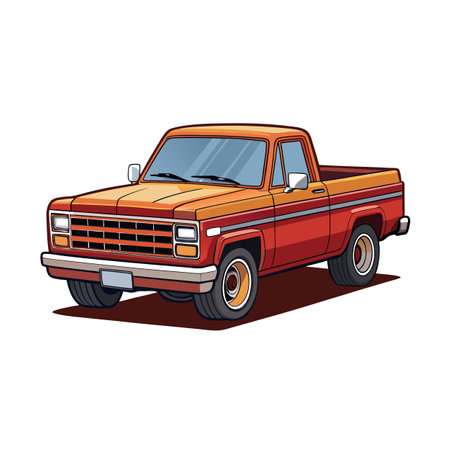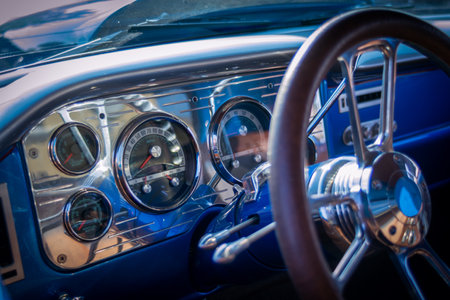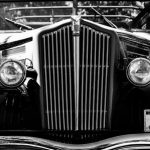1. Timeless Design and Aesthetic Appeal
Classic cars boast unique styling, elegant lines, and handcrafted details that stand out compared to modern vehicles. Unlike today’s mass-produced cars, which often prioritize aerodynamics and efficiency over style, classic cars were designed with artistry in mind. Their distinctive curves, chrome accents, and meticulously crafted interiors give them a charm that modern cars simply cannot replicate.
Attention to Detail
Classic cars were built during an era when craftsmanship was a top priority. Many components were hand-assembled, ensuring quality and durability. From intricate grilles to tailor-made leather seats, every detail was given special attention. This level of design excellence is rarely seen in modern mass-production vehicles.
Distinctive Styling
Each classic car model has a unique appearance, setting it apart from others on the road. Car manufacturers in the past focused on individuality, leading to a wide variety of memorable designs. Whether it’s the sleek fins of a 1957 Chevrolet Bel Air or the aggressive front end of a 1969 Ford Mustang, these designs remain iconic.
Comparison of Classic vs. Modern Car Design
| Aspect | Classic Cars | Modern Cars |
|---|---|---|
| Styling | Unique, handcrafted details | Streamlined, mass-produced |
| Materials | Premium metals, leather, wood accents | Lightweight composites, plastic panels |
| Customization | Extensive personalization options | Limited factory customization |
| Design Philosophy | Focused on aesthetics and presence | Prioritizes aerodynamics and efficiency |
The Emotional Connection
For many enthusiasts, classic cars evoke nostalgic memories and emotions. Owning or even seeing a classic car on the road brings back feelings of a bygone era, when driving was more about the experience than mere transportation. The combination of timeless design and emotional appeal ensures that classic cars will always hold a special place in the automotive world.
2. Nostalgia and Emotional Connection
Many enthusiasts associate classic cars with cherished memories from the past, creating a deep emotional bond. These vehicles represent a time when life seemed simpler, and every drive was an experience. Whether it’s a car they grew up riding in, a model their parents owned, or a dream car they finally obtained, classic cars often carry sentimental value that modern vehicles cant replicate.
A Trip Down Memory Lane
For many collectors and enthusiasts, owning a classic car is like owning a piece of their personal history. These cars remind them of family road trips, weekend outings, or even learning how to drive. The connection goes beyond just aesthetics—it’s about reliving special moments and keeping those memories alive.
Classic Cars and Family Traditions
Classic cars are often passed down from one generation to the next, preserving cherished family traditions. Grandparents restore vintage models with their grandchildren, parents share stories of their first car, and families bond over weekend drives in timeless automobiles. This emotional connection strengthens their love for classic cars and keeps the passion alive.
Why Classic Cars Evoke Nostalgia
| Reason | Example |
|---|---|
| Childhood Memories | Riding in the backseat of a classic Mustang on road trips |
| Family Traditions | Passing down a beloved vintage Corvette through generations |
| First Car Experience | Buying and restoring a 1960s Camaro from college days |
| Pop Culture Influence | Iconic movie cars like the DeLorean from “Back to the Future” |
The Irreplaceable Feeling of Driving a Classic
Unlike modern vehicles with automated features, classic cars require a driver’s full attention and skill. Shifting gears, adjusting carburetors, and feeling the vibration of the engine create a hands-on driving experience that many enthusiasts treasure. The sound, the smell of aged leather, and the unique handling of a vintage car all contribute to a nostalgic and deeply personal connection.

3. Mechanical Simplicity and Driving Experience
Unlike modern cars overloaded with technology, classic cars offer a pure, mechanical driving experience that enthusiasts appreciate. These vintage vehicles connect the driver directly to the road, without electronic assists altering the feel of the drive. Shifting gears, adjusting the choke, and manually tuning the engine are all part of the hands-on experience that makes classic cars so special.
The Joy of Mechanical Simplicity
Classic cars have fewer complex components, making them easier to understand and work on compared to todays tech-heavy vehicles. Enthusiasts enjoy the simplicity of carburetors instead of computerized fuel injection and mechanical linkages instead of drive-by-wire systems. This makes maintenance and repairs more approachable for DIY mechanics.
Classic vs. Modern Cars: Mechanical Differences
| Feature | Classic Car | Modern Car |
|---|---|---|
| Engine Management | Mechanical carburetor | Electronic fuel injection |
| Steering System | Manual or hydraulic steering | Electric power steering |
| Braking System | Simple hydraulic brakes | ABS and electronic brake distribution |
| Transmission | Manual with direct linkage | Automatic with electronic controls |
A More Engaging Driving Experience
Driving a classic car requires skill and awareness. Without electronic stability control, traction control, or automatic transmissions doing the work for them, drivers must pay full attention to road conditions, engine sounds, and gear changes. This level of engagement creates a deeper connection between driver and machine, making every journey more rewarding.
Feeling the Road
Modern cars often feel isolated due to electronic assists, but classic cars provide raw, unfiltered feedback from the road. Every bump, curve, and throttle adjustment can be felt through the steering wheel and pedals. This sensation is something that modern vehicles, with all their computerized aids, struggle to replicate.
4. Investment Potential and Collectibility
Classic cars often appreciate in value over time, making them desirable assets for collectors and investors. Unlike modern vehicles that typically depreciate as soon as they leave the dealership, classic cars have a history of increasing in value due to rarity, historical significance, and demand among enthusiasts.
Why Do Classic Cars Appreciate in Value?
Several factors contribute to the rising value of classic cars, including:
- Rarity: Limited production models or vehicles with significant historical relevance tend to be more valuable.
- Condition: Well-maintained or fully restored classic cars fetch higher prices in the market.
- Popularity: Certain makes and models have a cult following, boosting their worth.
- Market Trends: Demand for specific eras or styles can drive up prices over time.
Examples of Appreciating Classic Cars
Some classic cars have gained impressive value over the years. Here are a few notable examples:
| Classic Car Model | Original Price | Current Value | Appreciation Percentage |
|---|---|---|---|
| 1965 Ford Mustang | $2,500 | $40,000+ | 1500%+ |
| 1957 Chevrolet Bel Air | $2,500 | $60,000+ | 2300%+ |
| 1970 Dodge Challenger R/T | $3,200 | $100,000+ | 3000%+ |
Is Investing in Classic Cars a Good Idea?
Investing in classic cars can be a rewarding experience, both financially and personally. However, it requires careful research and consideration. Prospective buyers should factor in maintenance costs, storage, insurance, and market trends before making a purchase.
5. Passionate Community and Car Culture
Restoring classic cars isnt just about bringing an old vehicle back to life—its about preserving history and celebrating craftsmanship. Enthusiasts from all over the world dedicate countless hours to restoration projects, ensuring that these iconic cars continue to shine for future generations.
Restoration Projects: A Labor of Love
Classic car restorations require patience, skills, and a passion for automobiles. Whether its a full-frame restoration or minor cosmetic work, enthusiasts take great pride in reviving vintage vehicles. Many restoration projects become lifelong hobbies, allowing owners to form deep connections with their cars.
Car Shows: Showcasing Automotive History
Car shows offer a platform for classic car owners to proudly display their beautifully restored vehicles. These events celebrate automotive history, bringing together collectors, mechanics, and fans who all share a common love for vintage cars. From local meet-ups to renowned national exhibitions, car shows keep the passion alive.
Enthusiast Clubs: A Strong Community
Joining a classic car club provides enthusiasts with valuable resources, knowledge sharing, and camaraderie. These clubs offer everything from restoration tips to organized road trips, strengthening the classic car culture. Below are some of the benefits of being part of an enthusiast club:
| Benefit | Description |
|---|---|
| Technical Support | Access to expert advice on restoration and repairs |
| Networking | Connect with like-minded classic car owners and fans |
| Exclusive Events | Invitation to private car meets, shows, and collector gatherings |
| Parts & Resources | Find rare parts and tools through club connections |
Keeping the Classic Car Culture Alive
Classic cars continue to thrive due to the dedication of their passionate community. Restoration projects, car shows, and enthusiast clubs ensure that these automotive gems are not forgotten. Whether youre an admirer or an owner, being part of this culture is a rewarding experience that brings people together through a shared appreciation for timeless vehicles.


